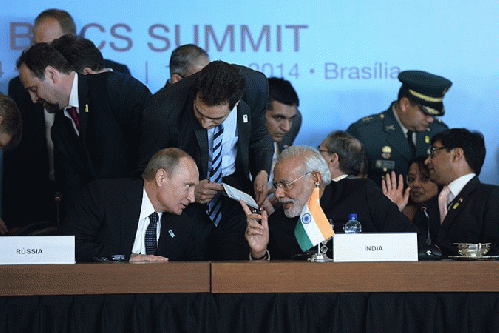Cross-posted from International Policy Digest
At the very moment that the Americans and their allies are trying to squeeze Russia and Iran with a combination of economic sanctions and political isolation, alternative poles of power are emerging that soon may present a serious challenge to the U.S. dominated world that emerged from the end of the Cold War.
This past summer, the BRICS countries -- Brazil, Russia, India, China and South Africa -- created an alternative to the largely U.S. controlled World Bank and International Monetary Fund (IMF), and the Shanghai Cooperation Organization (SCO) added 1.6 billion people to its rolls.
The BRICS construction of a Contingent Reserve Arrangement will give its members' emergency access to foreign currency, which might eventually dethrone the dollar as the world's reserve currency. The creation of a development bank will make it possible to by-pass the IMF for loans, thus avoiding the organization's onerous austerity requirements.
Less than a month after the BRICS' declaration of independence from the current strictures of world finance, the SCO -- China, Russia, Kazakhstan, Kyrgyzstan, Tajikistan, and Uzbekistan -- approved India, Pakistan, Iran and Mongolia for membership in the organization. It was the single largest expansion of the economic cooperation and security-minded group in its history, and it could end up diluting the impact of sanctions currently plaguing Moscow over the Ukraine crisis and Teheran over its nuclear program.
The Shanghai Cooperation Organization began as the Shanghai Five in 1996, and five years later became the SCO. Even before the recent additions, SCO represented three-fifths of Eurasia and 25 percent of the world's population.
A major focus of the SCO is security, although the countries involved have different agendas about what that exactly means.
Russia and China are determined to reduce U.S. and North Atlantic Treaty Organization (NATO) presence in Central Asia to what it was before the 2001 invasion of Afghanistan. The SCO has consistently rebuffed U.S. requests for observer status, and has pressured countries in the region to end U.S. basing rights. The U.S. was forced out of Karshi-Khanabad in Uzbekistan in 2006, and from Manas in Kyrgyzstan in 2014.
"At present, the SCO has started to counterbalance NATO's role in Asia," says Alexei Maslov, chair of the Department of Oriental Studies of the Higher School of Economics in Moscow, and the new members, he says, want in to safeguard their interests.
Given the current confrontation between NATO and Russia over the Ukraine, and tensions in the East China Sea between the U.S., Japan, and China, Moscow and Beijing may not agree on a number of issues -- in 1969 they came to blows over a border dispute -- but they are on the same page when it comes to limiting Washington's influence in their respective backyards.
Chinese Defense Minister Gen. Chang Wanquan said last year "China is ready to work with Russia to...expand the scope of bilateral defense cooperation." Last month Russia's Chief of Staff Gen. Valery Gerasimov declared that, "Russia is ready to make joint efforts with China to lift the relationship to a new high." China has been supportive of Russia in the Ukraine crisis.
For Iran, SCO membership may serve as a way to bypass sanctions currently pounding the Iranian economy. Russia and Iran signed a memorandum in August to exchange Russian energy technology and food for Iranian oil, a move that would violate U.S. sanctions. But Moscow -- already weathering sanctions that have weakened its economy -- may be figuring that there is little more the U.S. can do and still keep its European allies on board. Russian counter sanctions on the European Union (EU) have shoved a number of European countries back into recession, and the EU is worried that Russia will turn east and Europe will lose much of its Russian market share.
To a certain extent, that is already happening. When the 2,500-mile "Power of Siberia" pipeline is completed in 2018, it will supply China with about 15 percent of its natural gas, Russia's Rosneft and China's National Petroleum Corporation are jointly exploring oil and gas reserves in the arctic, and the Russians have also offered China a stake in the huge Vankor oil field in East Siberia. Since January 2014, some 30 percent of Russian oil exports have gone to Asia.
Teheran is reaching out to Beijing as well. Iran and China have negotiated a deal to trade Iran's oil for China's manufactured goods. Beijing is currently Iran's number one customer for oil. In late September, two Chinese warships paid a first ever visit to Iran, and the two countries navies carried out joint anti-piracy and rescue maneuvers.
For India and Pakistan, energy is a major concern, and membership in the oil and gas rich SCO is a major plus. Whether that will lead to a reduction of tensions between New Delhi and Islamabad over Kashmir is less certain, but at least the two traditional enemies will be sitting down to talk about economic cooperation and regional security on a regular basis.
There are similar tensions between SCO members Uzbekistan and Kyrgyzstan over borders, and both countries, plus Tajikistan, have squabbled over water rights.
(Note: You can view every article as one long page if you sign up as an Advocate Member, or higher).






